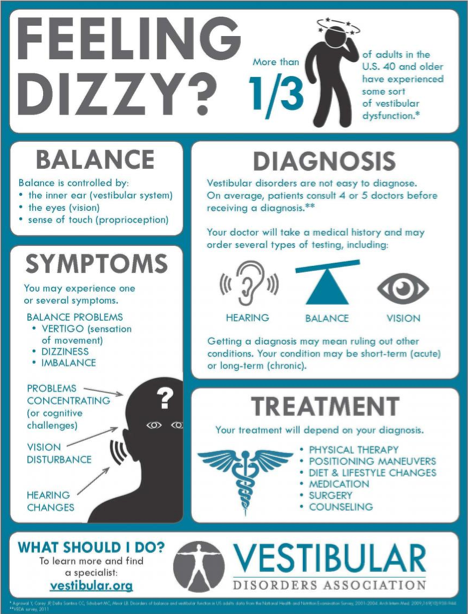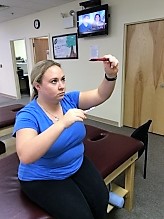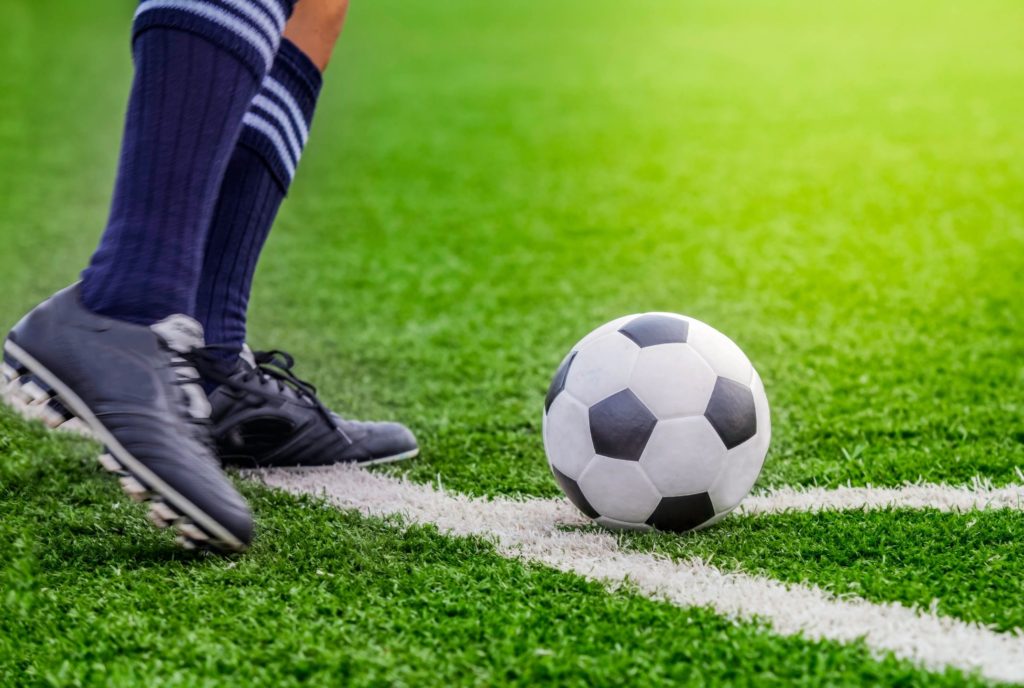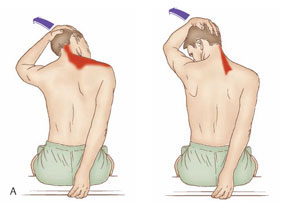Treatments for Persisting Symptoms
Treatment options exist if your symptoms continue longer than 3 weeks. There is no time limit for recovery so even if you’ve had problems for years, you can still see improvements!
This realm of therapy is always evolving and there are some excellent providers across the country who can help you in your recovery.
Here we will outline the types of therapy you may want to research in your area and what you should expect from these therapists.
Physical Therapy
From headache management, neck pain, exercise progressions, to dizziness, a PT can be vital to your recovery. Learn about the different ways a PT can help you recover.
Vision Therapy
Vision therapy can be life changing post concussion / TBI. Vision therapy can assist with headaches and eye strain during reading, difficulty with reading comprehension, and difficulties in school or at work. To learn more explore our section on vision therapy.
Speech Language Pathology
SLPs can assist with more than just swallowing disorders! A specialist in this area can help you with cognitive therapy assisting with organization and attention among many other skills.
Occupational Therapy
OTs serve many different purposes post concussion / TBI. They can assist with skills around the house, hand and wrist injuries, vision therapy and much more. Learn more in our section about Occupational Therapy
Physical Therapy
Physical therapists can offer a wide variety of services post concussion.
Manual / Orthopedic Therapy:
- If you were not managed properly, you may simply require proper manual therapy and strengthening.
- If you were managed properly, but are continuing to have symptoms, you should find a therapist with advanced training in treating the neck.
- Additional injuries occurring at the same time as your concussion.
- Cervicogenic Dizziness – Another type of dizziness exists! This type of dizziness can only be fixed with therapy addressing the neck.
- A trained physical therapist can identify cervicogenic dizziness from vestibular dizziness and will be able to work on the neck’s proprioception (awareness of where you are in space) to eliminate this form of dizziness.
Exercise Therapy:
- Some patients simply need help getting back into normal activity – a skilled provider can help you with this.
- Patients with symptoms of exercise or standing intolerance lasting more than 3 months, may have a condition called dysautonomia. This requires advanced training and finding the right type of physical therapist is crucial.
- You can learn more about treatment options through Phoenix here.
- Your provider can learn more about dysautonomia here.
- You can listen to our podcasts on dysautonomia here.
Vestibular Rehabilitation Therapy:
Vestibular therapy is available for patients who experience dizziness, lightheadedness, “room spinning” sensation provoked by movement, or recent onset / worsening motion intolerance / car sickness.
- Through the use of treatment for vertigo (which can be done in the first few days post injury) or the more advanced services of vestibular rehabilitation therapy, a good therapist can get you back to doing all the activities you love.
- Some patients may describe frequent nausea, nausea provoked by movement, or headaches associated with body or head movements. These patients can also benefit from habituation therapy when the cause is related to the vestibular system.
- There is a condition called Persistent Postural-Perceptual Dizziness (3PD), advanced providers can help you achieve symptom resolution for this condition!
- The hallmarks of 3PD are:
- Symptoms most days of the week lasting longer than 3 months
- Non-vertiginous (non-spinning) dizziness
- Visual motion sensitivity (big box stores, scrolling on the computer, panning images on the TV)
- The hallmarks of 3PD are:
Vision Therapy & Reflex Therapy are covered below.
Vision Therapy
Vision therapy can be a crucial piece of your recovery post concussion!
- Vision therapy can be completed by a PT or an OT (see below) but should always be supervised by a Doctor of Optometry (OD).
- We prefer ODs with the specialty certification FCOVD. To find these special types of eye doctors in your area please visit their organization’s website.
- It is crucial you are treated by someone who is qualified in this area.
- As an evolving therapy, not all providers will be created equal.
- We recommend FCOVDs as they will have the highest level qualification for the neuro-optometric exam and will likely be linked with appropriate providers in your area.
Symptoms benefiting from VT:
- Headaches and / or fatigue with school or work activities
- Headaches / eye pain / eye strain / blurred vision with reading or close work
- Headaches / eye pain / eye strain with computer use or phone screens
- Dizziness / eye pain / strain / headaches with head movements i.e., switching between a computer and the school board, the speedometer and the road when driving, or between people in a group conversation setting
- Difficulty keeping your place when reading
- Frequently re-reading the same sentence / poor memory with reading
Why to see a special OD:
- These eye doctors are not your typical providers! The standard eye exam only looks at acuity or quality of vision.
- Traditional ODs are able to tell you your prescription if you need glasses for near or far.
- They can also look at your eye health for diseases like glaucoma.
- Traditional ODs are able to tell you your prescription if you need glasses for near or far.
- Specialty ODs are looking at the eye’s quality of movement, how your eyes work together (binocular vision), how your eyes communicate with your brain, and how efficiently you do all of these tasks!
- Sometimes these ODs will prescribe a temporary reading lens or even a prism lens.
- These glasses will help you as a “band-aid” until the therapy begins to work.
- They are worth the investment (you can even fill them at Costco or Lenscrafters type store) because they often provide immediate relief!
- These lenses will allow you to be able to complete your homework or duties at work until the hard work during therapy allows you to return back to baseline or possibly even better than baseline!
It is estimated that upwards of 50% of concussion patients could benefit from some form of vision therapy! If you are struggling and “no longer like reading” or “have to work harder to maintain the same grades” why not see if you are one of these people!
Speech and Language Pathology: (Speech Therapy)
- There are different types of speech therapy although, most people often think of the therapy addressing swallowing or speech disorders!
- A SLP trained in Cognitive Therapy can address attention deficits, memory impairments, organizational skills and other aspects of recovery.
- It is important to seek a therapist specializing in these techniques for maximum benefit.
- A good SLP can make all the difference in your quality of life and your ability to return to work and school!
Occupational Therapy
Occupational Therapists (OTs) also have different types of specialties.
- OTs can specialize in upper extremity injuries (shoulder, elbow, wrist / hand) but this is not all they do!
OTs can help with:
- Your ability to complete activities of daily living (ADLs)
- Complete tasks around your house or community
- Help with energy conservation
- Assist with organization and management of life skills
- Driving – driving simulators and evaluations
OTs are detail oriented providers and have many talents.
If you are struggling post injury and haven’t sought an evaluation with an OT yet, give one who specializes in these areas a try!
Primitive Reflex Integration Therapy:
A new way of looking at an old technique. PRI can be completed by a variety of healthcare providers. Our co-founder and her colleague developed a new treatment paradigm for treating concussions/mTBI which has now been published in peer-reviewed journals and presented at local and national conferences. If your provider isn’t able to treat Primitive Reflexes have them visit our Provider Portal to learn more!
This exciting new treatment paradigm is great for head injuries from 3 days to years after your injury! Get started now!











